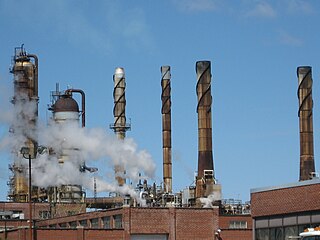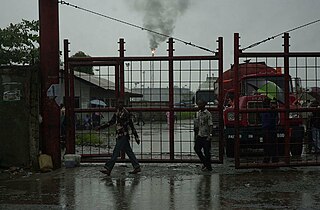
An oil refinery or petroleum refinery is an industrial process plant where petroleum is transformed and refined into products such as gasoline (petrol), diesel fuel, asphalt base, fuel oils, heating oil, kerosene, liquefied petroleum gas and petroleum naphtha. Petrochemical feedstock like ethylene and propylene can also be produced directly by cracking crude oil without the need of using refined products of crude oil such as naphtha. The crude oil feedstock has typically been processed by an oil production plant. There is usually an oil depot at or near an oil refinery for the storage of incoming crude oil feedstock as well as bulk liquid products. In 2020, the total capacity of global refineries for crude oil was about 101.2 million barrels per day.
The city of Warri is an oil hub within South-South Nigeria and houses an annex of the Delta State Government House. Warri City is one of the major hubs of the petroleum industry in Nigeria. Warri, Udu, Okpe and Uvwie are the commercial capital of Delta State with a population of over 311,970 people in 2006. The city is the indigenous territory of Itsekiri, Urhobo and Ijaw people.
The oil and gas industry is usually divided into three major sectors: upstream, midstream, and downstream. The downstream sector is the refining of petroleum crude oil and the processing and purifying of raw natural gas, as well as the marketing and distribution of products derived from crude oil and natural gas. The downstream sector reaches consumers through products such as gasoline or petrol, kerosene, jet fuel, diesel oil, heating oil, fuel oils, lubricants, waxes, asphalt, natural gas, and liquefied petroleum gas (LPG) as well as naphtha and hundreds of petrochemicals.

The Nigerian National Petroleum Company (NNPC) Limited is a state-owned oil company in Nigeria. Still a fully-owned government company, it was transformed from a corporation into a limited liability company in July 2022. NNPC Limited is the only entity licensed to operate in the country's petroleum industry. It partners with foreign oil companies to explore Nigeria's fossil fuel resources. The NNPC, with an asset of $153B (USD), is the largest national oil company in Africa. The company boasts of extensive infrastructure and investment in the downstream, midstream and upstream of the Nigerian petroleum industry.

Chennai Petroleum Corporation Limited (CPCL), formerly known as Madras Refineries Limited (MRL), is a subsidiary of Indian Oil Corporation Limited which is under the ownership of Ministry of Petroleum and Natural Gas of the Government of India. It is headquartered in Chennai, India. It was formed as a joint venture in 1965 between the Government of India (GOI), Amoco and National Iranian Oil Company (NIOC), having a shareholding in the ratio 74%: 13%: 13% respectively. From the grassroots stage CPCL Refinery was set up with an installed capacity of 2.5 million tonnes per year in a record time of 27 months at a cost of ₹430 million (US$5.0 million) without any time or cost overrun.

Kochi Refinery Limited (KRL) is a crude oil refinery in the city of Kochi in Kerala, India. It is the largest public sector refinery in India with a production capacity of 15.5 million tonnes per year. Formerly known as Cochin Refineries Limited and later renamed as Kochi Refineries Limited, it was acquired by Bharat Petroleum Corporation Limited in the year 2006. The refinery is situated at Ambalamugal, around 12 km (7.5 mi) east of the city centre.

Petron Corporation is the largest oil refining and marketing company in the Philippines, supplying more than a third of the country's oil requirements. It operates a refinery in Limay, Bataan with a rated capacity of 180,000 barrels per day (29,000 m3/d). From the refinery, Petron moves its products mainly by sea to 32 depots and terminals throughout the country.

Coryton Refinery was an oil refinery in Essex, England, on the estuary of the River Thames 28 miles (45 km) from central London, between Shell Haven Creek and Hole Haven Creek, which separates Canvey Island from the mainland.

Sirte Oil Company (SOC) is an oil and gas company in Libya operating under the state-owned National Oil Corporation (NOC). The company is located in Brega SOC’s operations include oil and gas exploration and production (E&P) and manufacturing.

Uvwie (/hu-we-ɛ/), is a principal urban Local government area in Delta State. It lies along the Warri River and it is one of the 24 Urhobo kingdoms. The entirety of the LGA is conurbated with the city of Warri, making it a greater part of Warri metropolitan area

Grangemouth Refinery is an oil refinery complex located on the Firth of Forth in Grangemouth, Scotland, currently operated by Petroineos. It is the only operating crude oil refinery in Scotland and currently one of the six remaining refineries in the UK. Grangemouth is the oldest refinery in the UK and supplies 65% of Scotland's oil products, including petrol and diesel.

The Montreal East Refinery was an oil refinery located in Montreal East and formerly Shell Canada's largest refinery. In October 2010, refinery operations permanently ceased and the facility was subsequently converted into a storage terminal.
Paradip Refinery is an oil refinery set up by Indian Oil Corporation in Paradip town in the state of Odisha. It was commissioned in 2016 with an installed capacity of 15 million tonnes per year. This refinery is spread over approximately 3,345 acres of land and is situated approximately 5 km southwest from the Paradip Port.
Bashneft – Ufimsky refinery plant is one of the most up-to-date oil refineries in Russia which can produce a wide range of petroleum products.

The Port Harcourt Refining Company,, is a Nigeria-based oil and gas company primarily specializing in the refining of crude oil into petroleum products. It is headquartered in Port Harcourt metropolitan area of Rivers State, southeastern Nigeria. The company is a subsidiary of the Nigerian National Petroleum Corporation (NNPC).
Cnergyico Pk Limited, formerly Byco Petroleum Pakistan Limited and Bosicor Pakistan Limited, is a Pakistani petroleum refinery based in Karachi. It is a subsidiary of the Mauritian company Cnergyico Industries Incorporated.
The Escravos–Lagos Pipeline System (ELPS) is a natural gas pipeline built in 1989 to supply gas from Escravos region of Niger Delta area to Egbin power station near Lagos in Nigeria. Subsequent spur lines from the ELP supply Delta power plant at Ughelli, Warri Refining and Petrochemicals Company at Ekpan, Uvwie. The West African Portland Cement (WAPCO) Plants at Shagamu and Ewekoro, industries at Ikorodu, City Gate in lkeja Lagos. Since the NIPP power plants emerged, ELPS is the major gas supply artery to the power plants in Nigeria.

The Niger Delta Avengers (NDA) is a militant group in the Niger Delta region of Nigeria. The group publicly announced their existence in March 2016.
The Dangote Refinery is an oil refinery owned by Dangote Group that was inaugurated on 22 May 2023 in Lekki, Nigeria. When fully operational, it is expected to have the capacity to process about 650,000 barrels of crude oil per day, making it the largest single-train refinery in the world. The investment is over US$19 billion.
Ubeji Community is an Itsekiri community located in the Warri South Local Government Area of Delta State, Nigeria. Ubeji community is near the Warri Refining and Petrochemicals Company in Warri, Warri South and as such, suffers huge environmental pollution. It is home to a large number of Itsekiris, it is a Suburb of the City of Warri It shares boundaries with Ifie Community, Aja-Etan Community, Ijala-Ikenren Community, Ekpan Community, etc.











